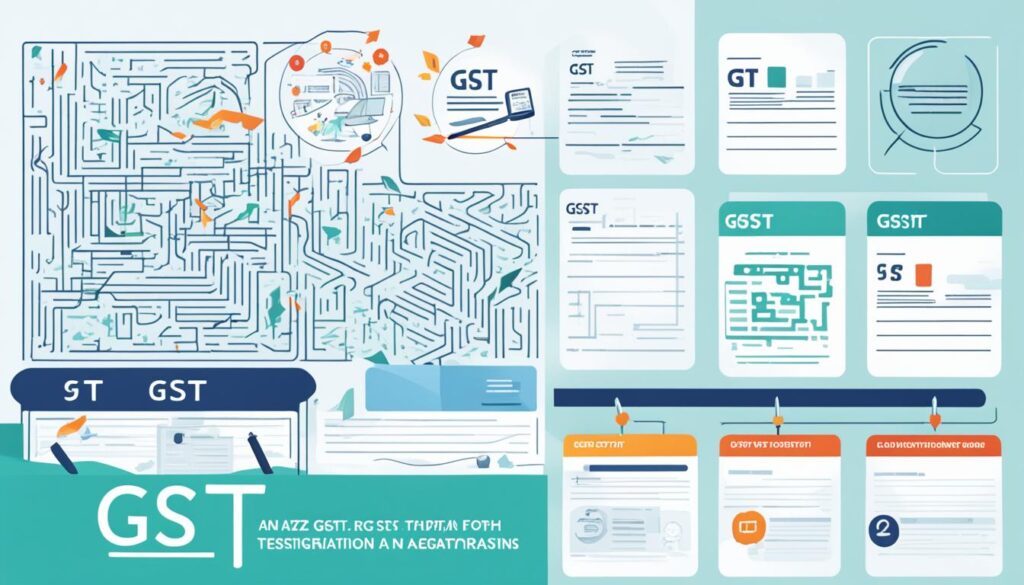Hyderabad , India
Ever thought GST registration could boost your startup in India’s fast-paced market? As India’s startup scene grows, knowing about GST registration is key for new entrepreneurs. We’ll look at how GST benefits startups and the easy process to register. With support from Startup India, companies get better tax deals and more funding and resources. Let’s see how GST registration can help your startup.
Key Takeaways
- The annual turnover should not exceed ₹100 crore for eligibility under Startup India.
- Startups can enjoy a 3-year income tax exemption upon certification by the IMB.
- Lower GST thresholds for small businesses greatly benefit startups.
- Startups can offset taxes paid on purchases against their sales tax.
- Government funds of ₹10,000 crore are allocated to support startups.
Understanding GST: An Overview
The Goods and Services Tax (GST) is a big step forward in India’s tax system. It started on July 1, 2017, and replaced many old taxes like VAT and service tax. Now, there’s one tax system for the whole country. The GST system in India has three main types: Central Goods and Services Tax (CGST), State Goods and Services Tax (SGST), and Integrated Goods and Services Tax (IGST).
Before GST, businesses dealt with many indirect taxes that changed from state to state. For example, the VAT threshold was 5 lakhs in most states, and service tax was 10 lakhs. Now, the GST has raised this to 20 lakhs, helping startups and small businesses more. The GST overview shows that businesses need to file about 11 different returns, with four basic ones for everyone.
This change aims to stop taxes from adding up, make more people pay taxes, and fight tax evasion. A big plus of the GST system is its multi-stage tax structure. It covers all steps from getting raw materials to selling the final product. This makes businesses work better by cutting down on costs and improving how goods move around.
Also, businesses can save a lot of tax under GST. For example, getting rid of the 5% VAT on office supplies can save a lot of money. So, knowing about the Goods and Services Tax is key for startups to handle registration, follow the rules, and manage taxes well.
The Importance of GST for Startups in India
In India, understanding GST is key for startups. Over 4,200 startups now enjoy easier tax rules thanks to GST. This system has merged 20 taxes into one, cutting costs by about 20%. This helps startups manage their money better.
At first, taxes might seem hard for startups. But GST makes it easier for businesses like restaurants and tech shops to follow the rules. Startups making less than Rs. 40 lakhs don’t need to register for GST, making it easier to start a business. GST also makes taxes more transparent, reducing corruption and building trust among entrepreneurs.
GST does more than just simplify taxes. It makes moving goods between states easier and improves logistics. Startups don’t have to visit tax offices as much, which helps them grow. With these changes, GST is a big boost for startups in India.
GST Registration Benefits India
Starting a business in India means you must register for GST. This step is key to standing out in a tough market. It brings many benefits, making your business run smoother and more profitable.
Enhanced Access to Input Tax Credit
One big plus of GST Registration Benefits India is getting Input Tax Credit (ITC). With GST, you can use taxes paid on goods and services to lower your tax bill. This saves money, letting you put it back into your business. Plus, the ITC system makes tracking taxes easy and keeps your books clear.
Reduction in Tax Compliance Complexity
Also, GST makes tax simpler by combining many taxes into one. This compliance reduction means less work for startups. We can focus more on our business and less on taxes. The online GST portal makes filing and reporting easy. For more details, check out Captain Biz.
Eligibility Criteria for GST Registration
For startups, knowing the GST Registration criteria is key to success in India. Businesses need to register for GST if they make more than Rs. 40 lakh a year from goods, Rs. 20 lakh from services, or Rs. 10 lakh in certain cases. This makes it important to understand startup eligibility based on their sales.
The rules on what counts as turnover vary by business type and state. For example, in states like Assam and Himachal Pradesh, the rules are easier. There, businesses need to register if they make Rs. 20 lakh from goods or Rs. 10 lakh from services. This shows how startup eligibility can change based on where you are.
Online sellers must register for GST no matter their sales. This shows how crucial GST compliance is for e-commerce. Getting registered usually takes 2 to 6 working days. Not registering can lead to big fines, like 10% of the tax owed or at least Rs. 10,000.
To wrap it up, the GST Registration criteria might seem tough, but many new businesses can meet the requirements. This lets them grow and succeed in India’s fast-changing market.
Steps to Complete the GST Registration Process
The GST registration process is easy to follow and mainly done online. It helps businesses of all sizes. Entrepreneurs should learn the steps to complete online GST registration. This includes several phases that need specific documents and information.
Online Registration Procedure
To start the GST registration, startup owners go to the GST portal at www.gst.gov.in. This is where all registration starts. First, they get a Temporary Reference Number (TRN) by giving details like the business name and PAN number.
After getting the TRN, we fill in details about the business and its owners. Here are the steps:
- Provide business details, including the type of business and its location.
- Upload essential documents, which may include the PAN card, partnership deed, certificate of incorporation, and proof of business address.
- Disclose bank account details, ensuring that the bank statements are up to date.
- Complete Part B of the application, which requires additional verification and data confirmation.
Here’s what you need for GST registration:
| Document Type | Description |
|---|---|
| PAN Card | Mandatory for all businesses. |
| Business Address Proof | Can include electricity bills, lease agreements, etc. |
| Partnership Deed or Certificate of Incorporation | Required for partnership firms and companies. |
| Personal Identification Documents | Aadhaar card or voter ID of business owners. |
| Bank Account Statements | Prove financial integrity and operations. |
After checking the details and documents, the GST number is given. This number is key for following GST rules. To make sure everything goes smoothly, getting professional help is a good idea. But, businesses can register on their own for free through the GST portal.

Benefits of GST Registration for Startups
For entrepreneurs, understanding the benefits of GST registration is key. It makes a business official and brings big financial perks. Let’s look at some main advantages.
Three-Year Tax Holiday for Startups
A tax holiday for new businesses is a big help. Startups that get a nod from the Inter-Ministerial Board can enjoy up to three years of no tax. This cuts down the early costs, letting us put money back into growing our business.
This tax break helps us grow faster. We can use money meant for taxes to improve our products or services.
Exemption from Certain Taxes
Startups also get tax breaks, making things easier on the wallet. These breaks help keep cash flowing and support innovation and growth. With GST registration, we can manage our money better.
These tax breaks include limits on how much we can earn, easing the tax load during our early years. This lets us focus on growing without the heavy tax burden.
| Benefits | Details |
|---|---|
| Tax Holiday Duration | Up to three years for certified startups |
| Gradual Tax Exemption | Exemptions available within specific income brackets |
| Financial Allocation | Allows for more funds directed towards growth and innovation |
| Improved Cash Flow | Reduces financial pressure during early stages of operation |
Understanding GST Compliance Benefits
Knowing the benefits of GST compliance is key for startups. It helps them avoid big fines and run smoother operations. Staying on top of GST returns and filing builds trust with customers and suppliers. It also makes managing money better.
Importance of GST Returns Filing
Filing GST returns is a must for businesses with GST registration. Doing it on time and right helps with tax reporting. This avoids legal trouble and fines, starting at ₹100 and going up to ₹200 for delays.
Following these rules makes operations smooth and boosts our image. Being seen as compliant shows we take tax laws seriously. This can lead to better business chances.
Integration of GST E-Invoicing
Using GST e-invoicing makes filing GST returns easier and more accurate. It helps with calculating GST and getting tax credits. A good compliance plan lets businesses claim these credits, improving cash flow and cutting taxes.
Being compliant also makes things more transparent. It helps with getting tax credits on time, which is good for the economy.
| Compliance Activity | Benefits | Penalties for Non-Compliance |
|---|---|---|
| GST Returns Filing | Ensures accuracy, prevents legal issues, enhances reputation | ₹100 for initial delay, ₹200 for further delays |
| GST E-Invoicing | Streamlines processes, facilitates automatic data sync, improves cash flow | Potential audits and scrutiny from tax authorities |
| Overall Compliance | Enhances credibility, attracts investors, promotes business growth | Frequent audits and potential penalties |
We suggest businesses learn more about GST compliance and its benefits. Check out this guide for more info.
Exploring the GST Composition Scheme
The GST Composition Scheme is great for small businesses and startups. It helps simplify taxes. It’s for businesses with a turnover of Rs. 1.5 crore or less. This scheme offers a simpler tax rate and less paperwork. Small business owners can grow their business and enjoy big GST benefits for small businesses.
Who Can Opt for the Composition Scheme?
To be eligible for the composition scheme, businesses must meet certain GST criteria. Those with an annual turnover of up to Rs. 15,00,000, or Rs. 18,75,000 in special states, can join. Important points to remember include:
- The scheme is for small manufacturers, traders, food service providers, artisans, and more, if they meet the turnover limits.
- New businesses must keep their turnover under Rs. 1.5 crore for manufacturers and traders, or Rs. 50 lakh for service providers in the current year.
- Businesses selling goods through e-commerce portals that collect tax at source are not eligible.
- Eligible businesses pay lower taxes, usually between 1% to 6%, based on their type.
- They only need to file a single quarterly return and an annual return, making things easier.
While the GST Composition Scheme has many benefits, there are some limits. You can’t claim Input Tax Credit (ITC) on purchases. Also, you can’t make sales across states. Knowing these points helps small businesses make smart tax choices.
Navigating the GST Refund Process
The GST refund process is key for startups that have paid more tax than they owed. We need to claim refunds well to keep our cash flow strong and stay sustainable. Startups can get refunds for Input Tax Credits (ITC) on goods bought, exports, or taxes paid on unused inputs.
To start the refund process, use Form RFD-01 and submit it within two years of the relevant date. Processing a refund takes about 30 days. Claims under Rs. 1,000 won’t get a refund, so it’s important to know this limit. For exporters, getting back IGST paid on goods helps improve cash flow and makes operations smoother.
When calculating refunds, subtract the extra tax paid from the total dues. If there are any issues, you’ll get Form RFD-03 for more information. Usually, 90% of refunds for exporters are given out within seven days, and the rest after checking documents. Following the rules is key for successful refund claims by startups.
Refunds can come from different situations, like deemed exports, supplies to special economic zones, or an inverted duty structure. You’ll need to provide detailed documents, like invoices and export service realization certificates. Good documentation makes the refund process smoother and shows you follow the rules.
In some cases, like taxes on deemed exports or court orders, you can claim a refund. If your claim is approved, you’ll get your refund within 60 days, and interest on any delay. For startups, keeping records in order and understanding the refund process helps us deal with financial challenges better.
Conclusion
For startups in India, getting registered for GST is crucial. It brings many benefits that help them grow and stay strong. The role of GST for startups is huge, making tax easier and offering big financial perks.
This is key under the Startup India program. It lets businesses grow without worrying about taxes. By understanding GST well, startups can use its benefits to improve cash flow and build trust with customers.
At Am Accountable, we offer virtual accounting services made just for startups in India. Our service lets you create a virtual accounting team in just 24 hours. This saves time and money while making your business run smoother.
If you’re facing GST challenges, call us at 91 91778 42756. We can help you follow the rules and grow your business in the Indian market.
FAQ
What are the benefits of GST registration for startups in India?
Registering for GST offers many perks like getting Input Tax Credit (ITC) and cutting down on compliance costs. It also makes taxes simpler. Startups get exemptions and tax holidays, which help ease their financial load in the early days.
How do we go about the GST registration process?
The GST registration process is mainly online. Startups can start by visiting the GST portal at https://www.gst.gov.in/. They need to get a Temporary Reference Number (TRN), fill in business and owner details, upload documents, and wait for verification to get their GST number.
What eligibility criteria must startups meet for GST registration?
Startups need to have an annual turnover over Rs. 40 lakhs to register for GST. All e-commerce entities must register, no matter their turnover. This makes registration open to many new businesses.
What is the importance of GST returns filing?
Filing GST returns is a must for startups and keeps them in line with the law. Even though not filing can lead to penalties, the government has made returns simpler. This helps startups report easier.
What is the GST Composition Scheme?
The GST Composition Scheme is for small businesses with an annual turnover of up to Rs. 1.5 crore. It lets businesses pay a fixed tax rate on their turnover. This makes compliance easier and lowers their tax load.
How can startups claim GST refunds?
Startups can claim refunds for Input Tax Credit (ITC) on goods bought, taxes paid on unused inputs, and exports. They must know the documents needed and the process to get the most cash flow and stay afloat.
What is GST e-invoicing and its benefits?
GST e-invoicing makes data syncing automatic, boosting compliance and helping with timely tax reports. By using e-invoicing, startups can work more efficiently and report taxes more accurately.








